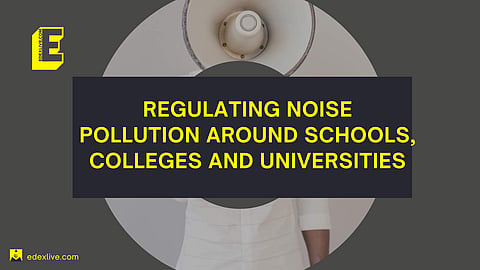Laws to regulate noise pollution near schools, colleges, universities
In recognition of the harmful effects of noise pollution on students, several states in India have enacted laws to regulate noise pollution near educational institutions. These laws vary from state to state, but they generally prohibit loud noises during school hours.
For example, the Delhi Noise Pollution (Control) Rules, 2003, prohibit the use of any loudspeakers or public address systems within 100 meters of any school or college.
The Karnataka Noise Prevention and Control Rules, 2002, impose a similar restriction, but also prohibit the use of any other noise-making devices, such as horns, whistles, and drums, within 100 metres of any school or college.
The penalties for violating noise pollution laws near schools and colleges also vary from state to state. For example, in Delhi, the first offence is punishable by a fine of up to Rs 5,000, and the second offence is punishable by a fine of up to Rs 10,000 and/or imprisonment for up to six months.
In Karnataka, the first offence is punishable by a fine of up to Rs 1,000, and the second offence is punishable by a fine of up to Rs 2,000 and/or imprisonment for up to one month.
Despite the challenges, the noise pollution laws in these states have had a positive impact on reducing noise levels near schools and colleges. For example, a study by the Central Pollution Control Board found that noise levels near schools in Delhi decreased by an average of 5 decibels after the noise pollution laws were enacted.
In addition to the state-level laws, there are also a number of central laws and regulations that deal with noise pollution. However, these laws are more general in nature and do not specifically address noise pollution near educational institutions.
One of the most important central laws is the Environment (Protection) Act, 1986. This law gives the central government the power to make rules and regulations to control noise pollution.
Under this law, the Central Pollution Control Board has issued a number of guidelines for the control of noise pollution, including guidelines for noise pollution near educational institutions.
Another important central law is the Noise Pollution (Regulation and Control) Rules, 2000. These rules lay down ambient noise standards for different areas, including silence zones. Silence zones are areas where noise levels are particularly low, such as around hospitals, educational institutions, and courts.
Under the Noise Pollution (Regulation and Control) Rules, 2000, the use of loudspeakers or public address systems is prohibited in silence zones.



